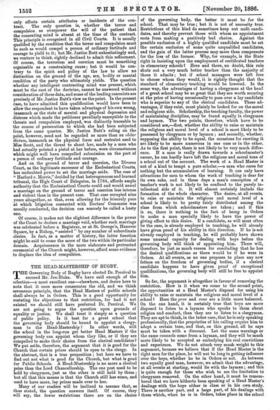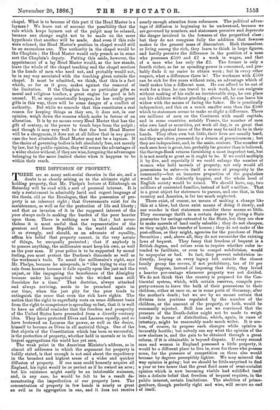THE HEAD-MASTERSHIP OF RUGBY.
THE Governing Body of Rugby have elected Dr. Percival to succeed Mr. Jex-Blake. We have said enough of the selection—a most excellent one—elsewhere, and desire here to note that it once more consecrates the old, and we think erroneous principle, that the Head Masters of public schools shall always be in Orders. This is a good opportunity for restating the objections to that restriction, for had it not existed we should still have preferred Dr. Percival. We are not going to argue the question upon grounds of equality or justice. We shall treat it simply as a question of public policy. Is it best for a great school that the governing body should be bound to appoint a clergy-
man to the Head-Mastership ? In other words, will the school in the long-run get better Head Masters if the governing body can appoint whom they like, or if they are compelled to make their choice from the clerical candidates ? We put aside, therefore, the argument that it is good for the Church that certain prizes should be open to the clergy. In the abstract, that is a true proposition ; but here we have to find out not what is good for the Church, but what is good for Public Schools. A Head-Mastership is no more a clerical prize than the Lord Chancellorship. The one post used to be held by clergymen, just as the other is still held by them ; but all that this means is that the Church still has some, and used to have more, lay prizes made over to her.
Many of our readers will be inclined to assume that, as thus stated, the question answers itself. Of course, they will say, the fewer restrictions there are on the choice of the governing body, the better it must bs for the school. That may be true ; but it is not of necessity true. Restrictions of this kind do sometimes keep out unfit candi- dates, and thereby prevent those with whom an appointment rests from making a positively bad choice. Against the possible exclusion of a highly qualified candidate must be set the certain exclusion of some quite unqualified candidates, and the gain of the latter process may more than compensate for the loss of the former. Why, for example, is the State right in insisting upon the employment of certificated teachers in elementary schools ? Here and there, no doubt, this rule shuts out a very much better teacher than the majority of those it admits ; but if school managers were left free to choose whom they would, it is rightly thought that the standard of elementary teaching would be lowered. In the same way, the advantages of having a clergyman at the head of a great school may be so great that they are worth securing at the price of having occasionally to pass over a lay candidate who is superior to any of the clerical candidates. These ad- vantages, if they exist, must plainly be looked for on the moral and religious side. Scholarship, the teaching faculty, the power of maintaining discipline, may be found equally in clergymen and laymen. The two points, therefore, which have to be considered are,—first, whether the ability to raise or maintain the religious and moral level of a school is most likely to be possessed by clergymen or by laymen ; and secondly, whether, supposing the ability to be equal, the occasions for exerting it are likely to be more numerous in one case or in the other. As to the first point, there is not likely to be very much differ- ence. If a man is really drawn towards a schoolmaster's career, he can hardly have left the religious and moral tone of a school out of the account. The work of a Head Master is not of a kind to tempt a pure scholar,—a man who cares for nothing but the accumulation of learning. It can only have attractions for men to whom the work of teaching is dear for its own sake, and in these days a man's conception of a teacher's work is not likely to be confined to the purely in- tellectual side of it. It will almost certainly include the formation of the whole character. The desire, at all events, to raise or maintain the religious and moral level of a school is likely to be pretty fairly distributed among the class from which schoolmasters are taken ; and if this is so, there is nothing in the fact of being in Orders to make a man specially likely to have the power of giving effect to this desire. If a candidate, as will most often be the case, is already employed in teaching, he will already have given proof of his ability in this direction. If he is not already employed in teaching, he will probably have shown some unusual capacity for dealing with boys before the governing body will think of appointing him. There will, therefore, be just as much reason for concluding that he has the desired qualifications as there would be if he were in Orders. At all events, as no one proposes to place any new fetters on the freedom of governing bodies, if a clerical candidate happens to have given proof of exceptional qualifications, the governing body will still be free to appoint him.
So far, the argument is altogether in favour of removing the restriction. How is it when we come to the second point, the opportunities at a Head Master's disposal for using his ability to raise or maintain the religious and moral level of a school ? Here the pros and cons are a little more balanced. On the one hand, it is certainly true that boys are more disposed to listen to a layman who speaks to them about religion and conduct, than they are to listen to a clergyman. They are apt to think, in the latter case, that he is only speaking professionally, that the proprieties of his calling require him to adopt a certain tone, and that, on this ground, all he says must be taken with a discount. Let the same warnings or the same counsels come from a layman, and they will be much more likely to be accepted as embodying his real convictions and experience. We do not attach very much weight to this argument, because we believe that if the Head Master is the right man for the place, he will not be long in getting influence over the boys, whether he be in Orders or not. As between two equally good men, however, we admit that the advantage, at all events at starting, would lie with the layman ; and this is quite enough for those who wish to see the limitation to clergymen removed. On the other hand, it must be remem- bered that we have hitherto been speaking of a Head Master's dealings with 'the boys either in class or in his own study. There is another part, and a large part, of his dealings with them which, when he is in Orders, takes place in the school
chapel. What is to become of this part if the Head Master is a layman 1 We leave out of account the possibility that the rule which keeps laymen out of the pulpit may be relaxed, because one change ought not to be made on the mere hypothesis that another will be made. And even if this rule were relaxed, the Head Master's position in chapel would still be an anomalous one. The authority in the chapel would be the Chaplain ; the Head Master would only preach as in some sort the Chaplain's deputy. Patting this aside, however, the appointment of a lay Head Master would, as the law stands, leave the whole of the chapel teaching and the chapel services in the hands of men who need not, and probably would not, be in any way associated with the teaching given outside the chapel. It must be admitted, we think, that this is a fact which, so far as it goes, makes against the removal of the limitation. If the Chaplain has no particular gifts as moral and religious teacher, a great engine for good is left unused. If, as may occasionally happen, he has really great gifts in this way, there will be some danger of a conflict of authority. But while we concede that this constitutes a real reason for keeping things as they are, it does not, in out opinion, weigh down the reasons which make in favour of an alteration. It is by no means every Head Master that has the gift of oratory, or the power to touch boys from the pulpit ; and though it may very well be that the best Head Master will be a clergyman, it does not at all follow that in any given case the best attainable Head Master may not be a layman. If the choice of governing bodies is left absolutely free, not merely by law, but by public opinion, they will secure the advantages of a wider choice without, if they are arise, foregoing the advantages belonging to the more limited choice when it happens to be within their reach.



































 Previous page
Previous page